
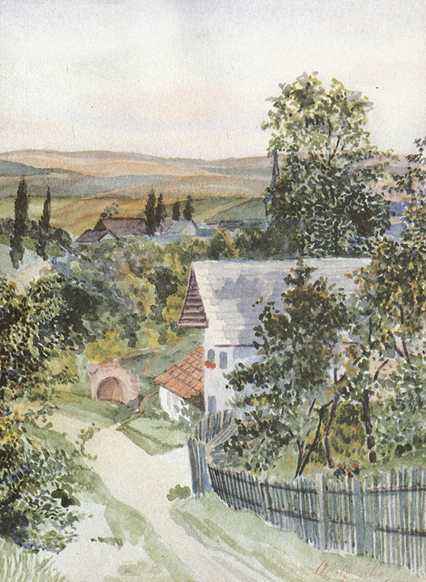
1672 (Exact Date Unknown) Stephan Heidler—the most distant direct ancestor of Adolf Hitler documented—is born in Walterschlag, Austria. [For further details, Click here.]
1908 Voelkishness: The Guido von List Society is officially founded in Vienna. (THP)
Germanic mysticism was a development of late 19th and early 20th century German romanticism loosely inspired by historical Germanic paganism and traditional concepts of occultism pioneered by Guido von List's Armanism from the 1870s, and gaining notability from the 1910s involving authors including List himself, Peryt Shou, Lanz von Liebenfels, Rudolf John Gorsleben, Rudolf von Sebottendorf, Friedrich Bernhard Marby, A. Frank Glahn and Julius Evola, resulting in organizations like the Guido von List Society, Germanenorden, Germanische Glaubens-Gemeinschaft, Order of the New Templars and Thule Society. The connection with historical Germanic culture is tenuous.
1917 Various: Russian Revolution: Abdication of Tsar Nicholas I: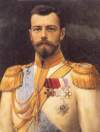
His family had ruled Russia for nearly three hundred years. A provisional government under Georgy Lvov is formed. Tsar Nicholas II's Abdication Proclamation:
In the days of the great struggle against the foreign enemies, who for nearly three years have tried to enslave our fatherland, the Lord God has been pleased to send down on Russia a new heavy trial. Internal popular disturbances threaten to have a disastrous effect on the future conduct of this persistent war. The destiny of Russia, the honour of our heroic army, the welfare of the people and the whole future of our dear fatherland demand that the war should be brought to a victorious conclusion whatever the cost. The cruel enemy is making his last efforts, and already the hour approaches when our glorious army together with our gallant allies will crush him. In these decisive days in the life of Russia, We thought it Our duty of conscience to facilitate for Our people the closest union possible and a consolidation of all national forces for the speedy attainment of victory. In agreement with the Imperial Duma We have thought it well to renounce the Throne of the Russian Empire and to lay down the supreme power. As We do not wish to part from Our beloved son, We transmit the succession to Our brother, the Grand Duke Michael Alexandrovich, and give Him Our blessing to mount the Throne of the Russian Empire. We direct Our brother to conduct the affairs of state in full and inviolable union with the representatives of the people in the legislative bodies on those principles which will be established by them, and on which He will take an inviolable oath. In the name of Our dearly beloved homeland, We call on Our faithful sons of the fatherland to fulfil their sacred duty to the fatherland, to obey the Tsar in the heavy moment of national trials, and to help Him, together with the representatives of the people, to guide the Russian Empire on the road to victory, welfare, and glory. May the Lord God help Russia!
World War I: Puerto Ricans become U.S. citizens and are recruited for war effort:
Barely a month before the United States enters World War I, President Woodrow Wilson signs the Jones-Shafroth act, granting U.S. citizenship to the inhabitants of Puerto Rico.
Located about 1,000 miles southeast of Florida—and less than half that distance from the coast of South America—Puerto Rico was ceded to the U.S. by Spain in December 1898 as part of the Treaty of Paris, which ended the Spanish-American War. In 1900, a Congressional act created a civil government for the island; the first governor under this act, Charles H. Allen, was appointed by President William McKinley and inaugurated that May in Puerto Rico's capital city, San Juan.
On March 2, 1917, Wilson signed the Jones-Shafroth Act, under which Puerto Rico became a U.S. territory and Puerto Ricans were granted statutory citizenship, meaning that citizenship was granted by an act of Congress and not by the Constitution (thus it was not guaranteed by the Constitution). The act also created a bill of rights for the territory, separated its government into executive, legislative and judicial branches, and declared Puerto Rico's official language to be English.
As citizens, Puerto Ricans could now join the U.S. Army, but few chose to do so. After Wilson signed a compulsory military service act two months later, however, 20,000 Puerto Ricans were eventually drafted to serve during World War I. Puerto Rican soldiers were sent to guard the Panama Canal, the important waterway, in operation since 1914, which joined the Atlantic and Pacific Ocean across the Isthmus of Panama in Central America. Puerto Rican infantry regiments were also sent to the Western Front, including the 396th Infantry Regiment of Puerto Rico, created in New York City, whose members earned the nickname Harlem Hell Fighters.
Later, during World War II, Puerto Rico became an important military and naval base for the U.S. Army. Its economy continued to grow, aided by a hydroelectric-power expansion program instituted in the 1940s. In 1951, Puerto Rican voters approved by referendum a new U.S. law granting the islanders the right to draft their own constitution. In March 1952, Luis Munoz Marin, Puerto Rico's governor, proclaimed Puerto Rico a freely associated U.S. commonwealth under the new constitution; the status was made official that July. Though nationalist agitation for the island's complete independence from the U.S. was a constant—as were calls for Puerto Rico to become a state—subsequent referendums confirmed the decision to remain a commonwealth. (History.com)
1919 Voelkishness: Philipp Stauff (alias Dietwart) writes to Brockhusen saying that the latter's resignation as Grand Master of the loyalist Germanenorden had been accepted. This does not seem to be the case as Brockhusen continues in office for quite some time. (THP)
1938 Nikolai Bukharin—long-time Bolshevik— is publicly tried in a so-called 'show trial' on trumped-up charges of conspiring to overthrow the Soviet state. He is quickly convicted and sentenced to death after making a forced confession. Freda Kirchwey writes in The Nation
The trial of Bukharin and his fellow oppositionists has broken about the ears of the world like the detonation of a bomb. One can hear the cracking of liberal hopes; of the dream of anti-fascist unity; of a whole system of revolutionary philosophy wherever democracy is threatened, the significance of the trial will be anxiously weighed. In spite of the trials, I believe Russia is dependable; that it wants peace, and will join in any joint effort to check Hitler and Mussolini, and will also fight if necessary. Russia is still the strongest reason for hope.
1939 Papacy: Eugenio Maria Giuseppe Giovanni Pacelli (Papal Secretary of State) is elected to succeed Pius XI as Pope. He becomes Pope Pius XII.
Pacelli lived in Germany from 1917, when he was appointed Papal Nuncio in Bavaria, until 1929. He knew what the Nazi party stood for, and was elected Pope in 1939 having said very little about Adolf Hitler's ideology beyond a 1935 speech, describing the Nazis as "miserable plagiarists who dress up old errors with new tinsel." Pacelli told 250,000 pilgrims at Lourdes on April 28, "It does not make any difference whether they flock to the banners of the social revolution, whether they are guided by a false conception of the world and of life, or whether they are possessed by the superstition of a race and blood cult." Even as Cardinal, Pacelli's actions regarding Hitler were controversial.
1941 Holocaust: Himmler visits a resettlement facility for ethnic Germans in Breslau. 'Racial experts' categorized the potential settlers as anything from 'very valuable' to 'reject.' Rejects were sent back to their own countries or to concentration camps. (THP) [See: What Was the Nature of Hitler's Anti-Semitism?]
1942 Holocaust: Minsk: Five thousand Jews are taken from the ghetto to a newly dug pit on the outskirts of town and machine-gunned. No ammunition is wasted on the hundreds of Jewish children seized that day: they are thrown into the pit alive to die of suffocation. (THP)
1943 Various: Church and Reich:
The place where, above all, the religious situation, by its unusual gravity, calls for special consideration is the territory called the 'Reichsgau Wartheland.' Six bishops resided in that region in August 1939; now there is left only one. In fact, the Bishop of Lodz and his auxiliary were, in the course of the year 1941, confined first in a small district of the diocese and then expelled and exiled in the 'Generalgouvernement.' Another bishop, Monseigneur Michael Kozal, Auxiliary and Vicar General of Wloclawek, was arrested in the autumn of 1939, detained for some time in a prison in the city and later in a religious house in Lad, and finally was transferred to the concentration camp at Dachau. Since His Eminency the Cardinal Archbishop of Gniezno and Poznan and the Bishop of Wloclawek, who had gone away during the period of military operations, were not allowed to return to their Sees, the only bishop who now remains in the 'Warthegau' is His Excellency Monseigneur Valentine Dymek, Auxiliary of Poznan; and he, at least up to November 1942, was interned in his own house.
If the lot of their Excellencies the Bishops has been a source of anxiety for the Holy See, the condition of an immense number of priests and members of religious orders has caused it, and still causes it, no less grief. In the territory now called 'Warthegau' more than 2,000 priests exercised their ministry before the war; they are now reduced to a very small number. According to accounts received from various quarters by the Holy See, in the first months of the military occupation not a few members of the secular clergy were shot or otherwise put to death, while others-some hundreds-were imprisoned or treated in an unseemly manner, being forced into employments unbecoming their state and exposed to scorn and derision.
Then, while numbers of ecclesiastics were exiled or constrained in some other way to take refuge in the 'Generalgouvernement,' many others were transferred to concentration camps. At the beginning of October 1941 the priests from the dioceses of the 'Warthegau' detained in Dachau already numbered several hundreds; but their number increased considerably in that month following a sharp intensification of police measures which culminated in the imprisonment and deportation of further hundreds of ecclesiastics. Entire 'Kreise' (districts) remained thus completely deprived of clergy. In the city of Poznan itself the spiritual care of some 200,000 Catholics remained in the hands of not more than four priests. No less painful was the fate reserved for the regular clergy. Many religious were shot or otherwise killed; the great majority of the others were imprisoned, deported, or expelled. In the same way far-reaching measures were taken against the institutions preparing candidates for the ecclesiastical state. The diocesan seminaries of Gniezno and Poznan, of Wloclawek, and of Lodzwere closed. The seminary in Poznan for the training of priests destined to work among Polish Catholics abroad was also closed. The novitiates and houses of formation of the religious orders and congregations were closed. Not even the nuns were able to continue their charitable activities without molestation. For them was set up a special concentration camp at Bojanowo, where towards the middle of 1941 about 400 sisters were interned and employed in manual labor.
To a representation of the Holy See made through the Apostolic Nunciature in Berlin (Memorandum N. 40.348 of June 11th, 1941) your Reich Ministry for Foreign Affairs replied in the Memorandum Poll III 1886 of September 28 of the same year that it was only a question of a temporary measure, taken with the consent of the Reich lieutenant for Wartheland, in order to supply the lack of housing for Polish Catholic sisters. In the same memorandum it was admitted that as a result of reorganization of charitable institutions many Catholic sisters were without employment. But,in spite of the fact that this measure was declared to be temporary, it is certain that towards the end of 1942 some hundreds of nuns were still interned at Bojanowo. It is established that for some time the religious were deprived even of spiritual help. Likewise in the matter of education and religious instruction of youth no attention was paid in the 'Warthegau' to the rights of the Catholic Church. All the Catholic schools were suppressed. The use of the Polish language in sacred functions, and even in the Sacrament of Penance, was forbidden. Moreover-and this is a matter worthy of special mention and is at variance with the natural law and with the dispositions accepted by the legal systems of all nations-for the celebration of marriage between Poles the minimum age limit was fixed at 28 years for men and 25 years for women.
Catholic Action was so badly hit as to be completely destroyed. The National Institute, which was at the head of the whole Catholic Action movement in Poland, was suppressed; as a result all the associations belonging to it, which were flourishing, as well as all Catholic cultural, charity, and social service institutions, were abolished. In the whole of the 'Warthegau' there is no longer any Catholic press and not even a Catholic bookshop.
Grave measures were repeatedly taken with regard to ecclesiastical property. Many of the churches closed to public worship were turned over to profane uses. From such an insult not even the Cathedrals of Gniezno, Poznan, Wloclawek, and Lodz were spared. Episcopal residences were confiscated, the real estate belonging to the seminaries, convents, diocesan museums, libraries, and church funds were confiscated or sequestered. Even before ecclesiastical property was affected, the allowances to the clergy had been abolished.
The administrative regulations published by the lieutenant's of police for the application of the ordinance of September 13th, 1941 made the situation of the Catholics in that region still more difficult. For example, on November 19, 1941 came a decree of the Reich lieutenant by which among other things it was set forth that, as from the previous September 13th, the property of the former juridical persons of the Roman Catholic Church should pass over to the 'Romisch-katholische Kirche deutscher Nationalitaet im Reichsgau Wartheland' insofar as, on the request of the above-mentioned 'Religionsgesellschaft' such property shall be recognized by the Reich lieutenant as 'non-Polish property.' In virtue of this decree practically all the goods of the Catholic Church in the 'Warthegau' were lost.
If we pass from the 'Warthegau' to the other territories in the East, we unfortunately find there, too acts and measures against the rights of the Church and of the Catholic faithful, though they vary in gravity and extension from one place to another. In the provinces which were declared annexed to the German Reich and joined up with the Gaue of East Prussia, of Danzig West Prussia and of Upper Silesia, the situation is very like that described above in regard to seminaries, the use of the Polish mother-tongue in sacred functions, charitable works, associations of Catholic Action, the separation of the faithful according to nationality. There, too, one must deplore the closing of churches to public worship, the exile, deportation, the violent death of not a few of the clergy (reduced by two-thirds in the diocese of Culma and by at least a third in the diocese of Katowice), the suppression of religious instruction in the schools, and above all the complete suppression in fact of the Episcopate. Actually, after the Bishop of Culma, who had left during the military operations, had been refused permission to return to his diocese, there followed in February 1941 the expulsion of the Bishop of Plock and his auxiliary, who both died later in captivity; the Bishop, the venerable octogenarian Monseigneur Julian Anthony Nowowiejski, died at Dzialdowo on May 28th, 1941, and the auxiliary, Monseigneur Leo Wetmanski, 'in a transit camp' on October 10th of the same year
In the territory called the 'Generalgouvernement,' as in the Polish provinces which had been occupied by Soviet troops in the period between September 1939 and June 1941, the religious situation is such as to cause the Holy See lively apprehension and serious preoccupation. Without pausing to describe the treatment meted out in many cases to the clergy priests imprisoned, deported, and even put to death, the confiscation of ecclesiastical property, the closing of churches, the suppression even of associations and publications of simply and exclusively religious character, the closing of the Catholic secondary and higher schools and of the Catholic University of Lublin, let it suffice to recall two series of specially grave measures: those which affect the seminaries and those which weigh on the Episcopate. When the buildings of the various seminaries had been completely or in part occupied, the intention for some time (November 1940-February 1941) was to reduce these institutions for the training of priests to two-those of Krakow and Sandomierz; then the others revere permitted to reopen, but only on condition that no new students were admitted, which in practice inevitably means that all these institutions will soon be closed.
Mention has several times been made of ecclesiastics deported or confined in concentration camps. The majority of them were transferred to the Altreich (Note: the Old Reich of Germany), where their number already exceeds a thousand. When the Holy See asked that they should be liberated and be permitted to emigrate to neutral countries of Europe or America (1940), the petition was refused; it was only promised that they should all be collected in the concentration camp at Dachau, that they should be dispensed from too hard labor, and that some should be permitted to say Mass, which the others could hear.
The treatment of the ecclesiastics interned at Dachau, which, for a certain time in 1941 was in fact somewhat mitigated, worsened against the end of that year. Particularly sorrowful were the announcements which for many months in 1942 came from that camp of the frequent deaths of priests, even of some young priests among them. Polish Catholics are not allowed to contract marriage in the territory of the Altreich; just as requests for religious instruction or instruction in preparation for confession and Holy Communion for the children of these workers are, in principle, not accepted.
World War II: The Battle of the Bismarck Sea:
On this day, U.S. and Australian land-based planes begin an offensive against a convoy of Japanese ships in the Bismarck Sea, in the western Pacific.
On March 1, U.S. reconnaissance planes spotted 16 Japanese ships en route to Lae and Salamaua in New Guinea. The Japanese were attempting to keep from losing the island and their garrisons there by sending 7,000 reinforcements and aircraft fuel and supplies. But a U.S. bombing campaign, beginning March 2 and lasting until the March 4, consisting of 137 American bombers supported by U.S. and Australian fighters, destroyed eight Japanese troop transports and four Japanese destroyers. More than 3,000 Japanese troops and sailors drowned as a consequence, and the supplies sunk with their ships. Of 150 Japanese fighter planes that attempted to engage the American bombers, 102 were shot down. It was an utter disaster for the Japanese—the U.S. 5th Air Force and the Royal Australian Air Force dropped a total of 213 tons of bombs on the Japanese convoy.
British Prime Minister Winston Churchill chose March 4, the official end of the battle, to congratulate President Franklin D. Roosevelt, since that day was also the 10th anniversary of the president's first inauguration. "Accept my warmest congratulations on your brilliant victory in the Pacific, which fitly salutes the end of your first 10 years." (History.com)
1944 Various World War II: Generalfeldmarschall und Oberbefehlshaber West Hugo Sperrle issues the famous Sperrle Orders:
i.) We (German Armed Forces) are not in the occupied western territories to allow our troops to be shot at and abducted by saboteurs who go unpunished. The countermeasures up to now, despite un-denied successes, will not alter the situation substantially if immediate self protection is not undertaken in instances where we are attacked or presented with insubordination. ii.) If troops are attacked in any manner, their commander is obliged to take his own countermeasures immediately, these include: iii.) There is to be an immediate return of fire. If innocent persons are hit this is regrettable but entirely the fault of the terrorists. The surroundings of any such incident are to be sealed off immediately and all the civilians in the locality, regardless of rank and person are to be taken into custody. Houses from which shots have been fired are to be burnt down on the spot. A report will not be made until these or similar immediate steps have been taken. iv.) In the judgement of the actions of troop commanders, the decisiveness and speed with which they act are to be regarded as the primary aspects. A slack and indecisive troop commander deserves to be severely punished because he endangers the lives of the troops under his command and produces a lack of respect for the German armed forces. Measures that are regarded subsequently as too severe, cannot in view of the present situation, provide reason for punishment.
Italy: Train passengers suffocate: A train stops in a tunnel near Salerno, Italy, and more than 500 people on board suffocate and die. Occurring in the midst of World War II, the details of this incident were not revealed at the time and remain somewhat murky
Train Number 8017 left Salerno heading for the rural area south of the city through the Apennine Mountains. Although it was a freight train that was not supposed to carry passengers, it was common at the time for both soldiers and civilians to hitch rides on any convenient train. Passing through the towns of Eboli, Persano and Romagnano, the 8017 had picked up approximately 650 passengers by the time it reached Balvano . . . . a tiny town between two long tunnels in the Apennines. It was raining as the 8017 began to ascend the Galleria delle Amri tunnel pass just outside of Balvano. Almost immediately, it was forced to stop . . . . either the train was unable to pull the overloaded freight cars up the slope or the train stopped to wait for a train descending in the opposite direction. In any case, the train sat idling in the tunnel for more than 30 minutes. While this might not have posed a severe danger in some circumstances, the train's locomotives were burning low-grade coal substitutes because high-grade coal was hard to obtain during the war and the coal substitutes produced an excess of odorless and toxic carbon monoxide.
Approximately 520 of the train's passengers were asphyxiated by the carbon monoxide as they sat in the train. The government, in the midst of an intense war effort, kept a lid on the story—it was barely reported at the time although it was one of the worst, and most unusual, rail disasters of the century and came less than two months after a train wreck in the Torro tunnel in Spain killed 500 people.
1945 World War II Various: Western Front: Romania: King Michael is forced by the Soviets to dismiss his government. 1946 Nuremberg Tribunal: Prosecution's Conclusion of the Criminality of Organizations:
Gen. Rudenko:The Defense Counsel for the SS, Mr. Babel, mentioned the existence of a research department for dog breeding within the SS. It would appear that this was an organization of general utility. It seems, however, that the learned dog breeders in this organization were engaged in training hounds to attack human beings and to tear their appointed victims to pieces. Can we isolate these dog breeders from the SS? In Danzig another scientific research institute was engaged in the preparation of soap from human fat. Perhaps we should exonerate these soap boilers as well from all criminal responsibility. 1953 Wunderwaffen: In an article entitled Space Superiority, published in the March-April issue of Ordnance, Werner von Braun, Hitler's former chief rocket scientist now working for the US, writes: The atom bomb may have been the "ultimate weapon" heretofore, but this will not be the case much longer. 1969 Soviet Union and Chinese armed forces clash:
In a dramatic confirmation of the growing rift between the two most powerful communist nations in the world, troops from the Soviet Union and the People's Republic of China fire on each other at a border outpost on the Ussuri River in the eastern region of the USSR, north of Vladivostok. In the years following this incident, the United States used the Soviet-Chinese schism to its advantage in its Cold War diplomacy. [For further information, click here]
Edited by Levi Bookin (Copy editor) Click to join 3rdReichStudies FAIR USE NOTICE: This site may contain copyrighted material the use of which has not always been specifically authorized by the copyright owner. We are making such material available in our efforts to advance understanding of historical, political, human rights, economic, democracy, scientific, environmental, and social justice issues, etc. We believe this constitutes a 'fair use' of any such copyrighted material as provided for in section 107 of the US Copyright Law. In accordance with Title 17 U.S.C. Section 107, the material on this site is distributed without profit to those who have expressed a prior interest in receiving the included information for research and educational purposes. If you wish to use copyrighted material from this site for purposes of your own that go beyond 'fair use', you must obtain permission from the copyright owner. Please note that the list-owner and the moderator are not responsible for, and do not necessarily approve of, the random ads placed on our pages by our web server. They are, unfortunately, the price one pays for a 'free' website.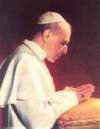
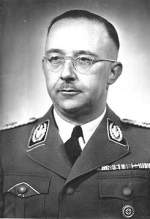
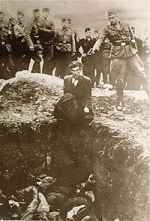
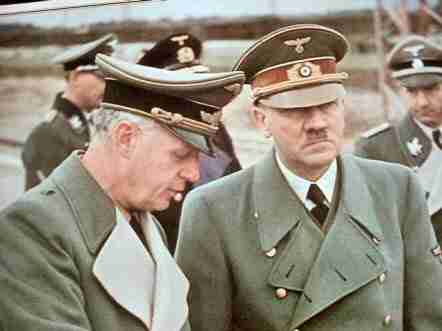

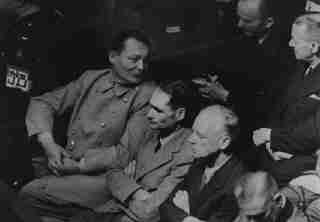
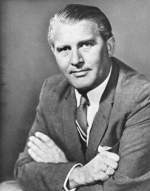
It is now the time � when we must relegate strategic bombing to a secondary position and seek a new "ultimate weapon" which [will] preferably not only return to us that deciding "edge" we once had over Red aggression, but likewise [be] kinder to the taxpayer.
We need fear no fundamental, immovable roadblocks along the path of further development of the large liquid [-fueled] rocket, as the principle difficulties have already been conquered. At some distance along this path—a very attainable distance, by the way—stands the multistage, orbital rocket ship bearing a crew out beyond the stratosphere.
The first nation to launch such a rocket will possess, in my opinion, what may well be the long-sought "ultimate weapon." [A space station is also recommended.] The first and obvious military application of such a station is that of reconnaissance and observation.
The station would also operate improved radarscope equipment far superior to the present aircraft-borne devices and thus able to penetrate reliably the thickest cloud overcast.
An orbital reconnaissance station can pull up an iron curtain!
When it comes down to cases, the outstation is also a launching platform for orbital missions, against which there cannot be countermeasures. If we fire an atom-tipped, winged rocket backward from the station, so that its thrust diminishes its orbital velocity (relative to the station) by 1,070 miles per hour, it will succumb to gravity, and approach the earth on an elliptical path. [See: Wunderwaffen: Hitler's Deception and the History of Rocketry.]
levi.bookin@gmail.com






